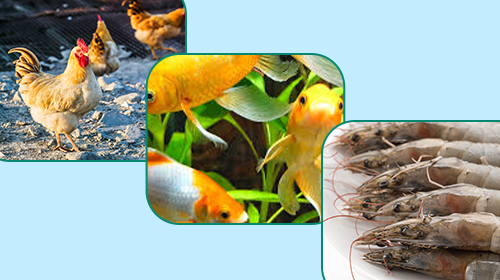Lecithin in the breeding and feeding of farm and domestic animals
Lecithin is indispensable in animal nutrition. Its special properties promote the health of the animals and increase the profitability of agricultural livestock farming. Optimised feed utilisation results in faster and stronger growth with improved meat quality and animal health, which is characterised by higher resistance to infections and other diseases and a lower mortality rate.
Lecithin in animal nutrition stands, amongst others, for

- an improved digestibility of fat
- an increase in growth and weight
- reduction of digestive disorders
- a strengthening of the immune system
- an improvement of metabolism
Lecithin plays a major role not just in livestock farming. Lecithin is also an important ingredient in pet foods - from dogs, cats and small animals to birds - where it ensures, among other things, good digestibility and usability, an animal-friendly texture and a robust immune system.
As an integral component of the nutrition, lecithin shows positive effects in a wide range of animal species:
Breeding Sows
- Stabilises health and motivation
- Saves feed owing to its better utilisation
- Increases the litter size
- Increases the number of weaned piglets
- Reduces the idle time
- Increases the contribution margin per sow
- Increases the weight at birth and weaning weight of the piglets
Calves
Lecithin also plays an important role in calf rearing and fattening:
- Reduces digestive disorders
- Increases the intake of feed
- Increases the gain in body weight
- Enhances the digestibility of the nutrients
- Increases the utilisation of nutrients and energy
- Promotes resistance to diseases and infectionse
- Increases the vitality
- Strengthens the constitution and condition
Chicken
Lecithin is also an important factor in the rearing of chicken:
- improves the utilisation of feed
- enhances the gain in body weight
- reduces losses caused by illness or death
- favours the quality of the carcass
- improves the digestion of the nutrients
Laying Hens
Laying hens produce more efficiently:
- Improves the digestion of the nutrients
- Reduces the amount of feed per egg
- Reduces losses caused by illness or death
- Prevents the fatty liver syndrome
- Stabilises the laying curve
Turkey, other poultry and birds in general
Birds benefit from a lecithin additive in the feed in many ways:
- improves the digestion of the nutrients
- improves the growth rate and the utilisation of feed
- reduces losses caused by illness or death
- activates the metabolism
- strengthens the convalescence
Rabbits
Lecithin can also be added to the feed of small animals such as rabbits, hares and chinchillas:
- increases the intake of feed
- enhances the digestibility of the nutrients
- intensifies the metabolism
- increases the gain in body weight
- ensures a dense, full and supple coate
- strengthens the constitution and condition
- strengthens fertility in breeding
Horses
In sport and race horses and their foals, lecithin strengthens, amongst other things, the immune system and improves metabolism:
- improves the absorption and conversion of energy
- shortens the recovery phase after muscular exertion
- reduces the stress syndrome
- increases the vitality, condition and constitution
- ensures a smooth and shiny coat
- activates the metabolismn
Fish (aquacultures)
Fish farming can also benefit in many ways from lecithin in the feed mix or as an admixture in fat:
- improves the growth rate and the utilisation of feed
- promotes the development of fingerlings
- reduces losses
- strengthens the fertility
- intensifies the liver metabolism
- increases the rearing rate of young fish
Shrimps, crabs and other crustaceans (aquacultures)
The addition of lecithin promotes the rearing of many species that are commercially available as seafood:
- stable metabolic processes
- improved nutrient absorption
- better feed utilisation and stronger gain in weight
- reduced failure rate
Dogs and cats
Lecithin plays a major role not just in livestock farming. Lecithin is also an important ingredient in pet foods - for dogs, cats and small animals to ornamental birds - where it ensures, among other things, good digestibility and usability, an animal-friendly texture and a robust immune system:
- strengthens health, well-being and vitality
- reduces the regeneration time after physical exertion
- improves the skin
- ensures a dense, shiny and supple coat
- strengthens the resistance to infections
Zoo animals
The quality of feed plays a major role in case of zoo animals too: As with pets and farm animals, lecithin can bring about a whole range of improvements:
- strengthens health, well-being and vitality
- improves the digestion of the nutrients
- improves the growth rate and the utilisation of feed
- ensures a dense, shiny and supple coat or a fine plumage
- strengthens the resistance to infections
Pigs
Whether piglets, breeding sows or fattened pigs - the many positive properties of the feed that has been upgraded with lecithin are good for keeping and profitability. For instance, lecithin acts as a source of choline and can significantly reduce digestive disorders.
Piglet Rearing
- improves the utilisation of feed
- reduces digestive disorders
- increases the gain in body weight
- strengthens the vitality
- reduces stress after feed change or relocation
- reduces the mortality rate
- increases the protection against infection



